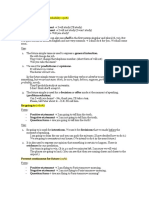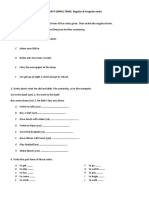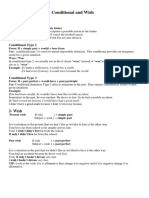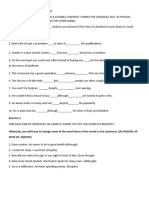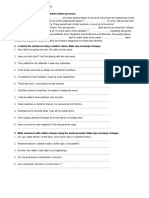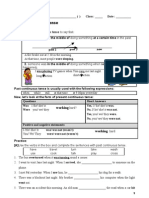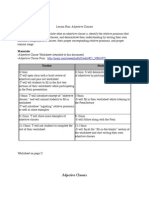Reported Speech Rules
Reported Speech Rules
Uploaded by
VSNG EnglishCopyright:
Available Formats
Reported Speech Rules
Reported Speech Rules
Uploaded by
VSNG EnglishCopyright
Available Formats
Share this document
Did you find this document useful?
Is this content inappropriate?
Copyright:
Available Formats
Reported Speech Rules
Reported Speech Rules
Uploaded by
VSNG EnglishCopyright:
Available Formats
Reported Speech (Indirect Speech) In reported speech, we use a 'reporting verb' like 'say' or 'tell'.
If this verb is in the present tense, we just put '[she] says' and then the sentence:
I like ice cream ---> She says she likes ice cream
But, if the reporting verb is in the past tense, then usually we change the tenses in the reported speech: Direct Speech Present Simple -> Past Simple I like ice cream Present Continuous -> Past Continuous I am living in London Present Perfect -> Past Perfect I havent seen Julie Present Perfect Continuous -> Past We have been playing tennis. Perfect Continuous Past Simple -> Past Perfect Past Continuous -> Past Perfect Continuous will -> would can -> could may -> might must -> must / had to I bought a car Reported Speech She said (that) she liked ice cream. She said she was living in London. She said she hadnt seen Julie. They said they had been playing tennis.
She said she had bought a car OR She said she bought a car. She said she had been walking along the I was walking along the street street. Ill see you later She said she would see me later. I can speak perfect English She said she could speak perfect English. It may become colder over She said it might become colder over night night. She said she must study at the weekend "I must study at the weekend" OR She said she had to study at the weekend
Past Perfect, Past Perfect Continuous, would, could, should, might do not change.Occasionally, we dont need to change the present tense into the past if the information in direct speech is still true. Also, when we are reporting past tenses, and we see the events from the same viewpoint as the original speaker, it is not necessary to change the tense.
The sky is blue ---> She said that the sky is/was blue. The earthquake happened at half past seven ---> The radio said that the earthquake happened at half past seven. If the reported sentence contains an expression of time, you must change it to fit in with the time of reporting. For example we need to change words like here and yesterday if they have different meanings at the time and place of reporting. This (evening) --> that (evening) today --> that day (days) (A week) ago --> (a week) before now --> then Yesterday --> the day before/the previous day next (week) --> the following (week) / the (week) after day/the day after last (weekend) --> the (weekend) before / the previous (weekend)
these (days) --> those here --> there this --> that tomorrow --> the next/following
I have worked here for two years. --> She said she had worked there for two years. Ill meet you at school tomorrow. --> She said she would meet me at school the next day.
Imagine you want to repeat sentences that you heard two weeks ago in another place. Rewrite the sentences in reported speech.
1. They said, "This is our book." They said 2. She said, "I went to the cinema yesterday." 3. He said, "I am writing a test tomorrow." 4. You said, "I will do this for him." 5. She said, "I am not hungry now." 6. They said, "We have never been here before." 7. They said, "We were in London last week." 8. He said, "I will have finished this paper by tomorrow." 9. He said, "They won't sleep." 10. She said, "It is very quiet here."
You might also like
- Present Simple Vs Present ContinuousDocument2 pagesPresent Simple Vs Present ContinuousTamara MiličevićNo ratings yet
- Irregular Verbs Test 7Document1 pageIrregular Verbs Test 7Andreea Bucur100% (1)
- Rewrite Verb Tenses BachilleratoDocument13 pagesRewrite Verb Tenses BachilleratoAntonia Vidal TaylorNo ratings yet
- Future Simple Tense (Probability 50%) : Probably, SurelyDocument2 pagesFuture Simple Tense (Probability 50%) : Probably, SurelyMacarenaNo ratings yet
- Defining Relative Pronouns ExerciseDocument2 pagesDefining Relative Pronouns ExerciseIban CurduNo ratings yet
- Unit 3 Passive VoiceDocument16 pagesUnit 3 Passive Voicemiriam_bello_2950% (2)
- future-time-clauses-WORKSHEET 7th-1Document2 pagesfuture-time-clauses-WORKSHEET 7th-1marco antonio choque hinojosaNo ratings yet
- GrammarDocument49 pagesGrammarIka SetyawatiNo ratings yet
- Phrasal Verbs Grammar Quiz (Englishclub) : A) A Phrase B) An Adverb C) A VerbDocument2 pagesPhrasal Verbs Grammar Quiz (Englishclub) : A) A Phrase B) An Adverb C) A VerbGabriela RivadeneiraNo ratings yet
- Past Simple Used To WouldDocument2 pagesPast Simple Used To WouldJose Luis LanchipaNo ratings yet
- Present Perfect Tense: Definition, Rules and Useful ExamplesDocument4 pagesPresent Perfect Tense: Definition, Rules and Useful ExamplesAbdul RaufNo ratings yet
- Defining and Non-Defining Relative Clauses T&EDocument7 pagesDefining and Non-Defining Relative Clauses T&Ephantom26No ratings yet
- Auxiliary VerbDocument18 pagesAuxiliary VerbKinkin MatJinNo ratings yet
- If ClauseDocument7 pagesIf ClauseCanan SezenNo ratings yet
- 2nd and 3rd ConditionalDocument4 pages2nd and 3rd ConditionalMing ZhouNo ratings yet
- Revision of TensesDocument2 pagesRevision of TensesSimina BusuiocNo ratings yet
- Past Simple TenseDocument4 pagesPast Simple TenseAlberto B. De la Cruz ValbuenaNo ratings yet
- Relative Clauses - Fil in The Blanks 2Document1 pageRelative Clauses - Fil in The Blanks 2Natalia Soledad RojasNo ratings yet
- Can-Could-To Be Able To 1Document12 pagesCan-Could-To Be Able To 1GeaninaLucianaNo ratings yet
- MODALS ADVICE, DEDUCTION, and PAST OBLIGATION For B+ LEVELDocument56 pagesMODALS ADVICE, DEDUCTION, and PAST OBLIGATION For B+ LEVELMehrdad HosseinpourNo ratings yet
- Exercises On Tenses-SSDocument3 pagesExercises On Tenses-SSHà Mai AnhNo ratings yet
- Reported SpeechDocument5 pagesReported SpeechCésar Muñoz NicolásNo ratings yet
- Present Perfect SimpleDocument1 pagePresent Perfect SimpleGeorgiana_DRNo ratings yet
- English On Line CourseDocument13 pagesEnglish On Line CourseDaniela Frediani RezendeNo ratings yet
- Two-Syllable Adjectives Comparatives and Superlatives (Including Exceptions)Document2 pagesTwo-Syllable Adjectives Comparatives and Superlatives (Including Exceptions)Vlada ZaicenkoNo ratings yet
- Gerunds and InfinitivesDocument6 pagesGerunds and InfinitivesGeorge Zarpate100% (1)
- Tense RevisionDocument6 pagesTense RevisionJosipa BlaževićNo ratings yet
- Running Dictation For Primary School KidsDocument1 pageRunning Dictation For Primary School KidsIvana Slavevska-MarkovskaNo ratings yet
- Grammar About Let, Be Allowed To, MakeDocument4 pagesGrammar About Let, Be Allowed To, MakeArjuna D'ChenNo ratings yet
- Conditional and WishDocument2 pagesConditional and Wishfatima ikenNo ratings yet
- CONTRAST CONNECTORS ActivityDocument2 pagesCONTRAST CONNECTORS ActivityMariel Garza Lopez100% (1)
- Relatives Clauses - With Answer KeyDocument3 pagesRelatives Clauses - With Answer KeycaroNo ratings yet
- Review 5º PrimariaDocument6 pagesReview 5º PrimariaMarNo ratings yet
- Connecting Contrasting IdeasDocument6 pagesConnecting Contrasting IdeasgamzeNo ratings yet
- Little Exam Grammar Drills TestsDocument3 pagesLittle Exam Grammar Drills TestsAnne RobertsNo ratings yet
- Connectors For B1Document1 pageConnectors For B1Ana G100% (1)
- Modal Verbs of Deduction - Sentence Completion - Open ClozeDocument1 pageModal Verbs of Deduction - Sentence Completion - Open ClozeMilence89No ratings yet
- Reported Speech - Unit 3 c1+Document5 pagesReported Speech - Unit 3 c1+Aitor Garcés-ManzaneraNo ratings yet
- Indefinite PronounsDocument1 pageIndefinite PronounsIvàn RamìrezNo ratings yet
- Passive VoiceDocument8 pagesPassive Voicealexandru_gheoNo ratings yet
- Causative VerbDocument5 pagesCausative VerbYosua AletheianNo ratings yet
- Subject Pronouns and Possessive AdjectivesDocument2 pagesSubject Pronouns and Possessive Adjectiveslpa_20100% (1)
- 2 - Fce - Conditional 0123 Rules 2015Document10 pages2 - Fce - Conditional 0123 Rules 2015Alba Fortuny HueteNo ratings yet
- 1A º ESO Actividades Repaso para Verano Curso 2122Document13 pages1A º ESO Actividades Repaso para Verano Curso 2122Xavi Montaño OliveraNo ratings yet
- Времена Past Simple и Present Perfect Simple Различия в Употреблении Упражнения с ОтветамиDocument9 pagesВремена Past Simple и Present Perfect Simple Различия в Употреблении Упражнения с ОтветамиAnderson Zorrilla RosalesNo ratings yet
- Past Continuous TenseDocument2 pagesPast Continuous Tenseteresalui100% (1)
- Inglés Instrumental: Unit 1. Verb Tenses. Present Simple and ContinuousDocument6 pagesInglés Instrumental: Unit 1. Verb Tenses. Present Simple and ContinuousclaudiaNo ratings yet
- Mixed ConditionalDocument6 pagesMixed ConditionalAlexitaamorNo ratings yet
- Tenses B2Document4 pagesTenses B2Lucía MolinariNo ratings yet
- Past Simple, Past Continuos and Past PerfectDocument9 pagesPast Simple, Past Continuos and Past PerfectBRAWL & LUISNo ratings yet
- Click VOC - Gradable and Extreme AdjectivesDocument4 pagesClick VOC - Gradable and Extreme AdjectivesVictor ManfrinNo ratings yet
- Celebrations HalloweenDocument4 pagesCelebrations HalloweenFiliberto ColamoreaNo ratings yet
- Unit 4 ConditionalsDocument14 pagesUnit 4 Conditionalsmiriam_bello_29No ratings yet
- Passive Voice-Future TensesDocument5 pagesPassive Voice-Future Tensesmerlita paruriNo ratings yet
- Inglés Instrumental: Unit 1. Verb Tenses. Present Perfect Simple and ContinuousDocument4 pagesInglés Instrumental: Unit 1. Verb Tenses. Present Perfect Simple and ContinuousclaudiaNo ratings yet
- 2nd Bachillerato Global RevisionDocument4 pages2nd Bachillerato Global RevisionanaojerNo ratings yet
- Modal Verbs of Deduction Explanation and Activities IIIº MedioDocument9 pagesModal Verbs of Deduction Explanation and Activities IIIº MedioValeska VillarroelNo ratings yet
- Direct & Indirect SpeechDocument28 pagesDirect & Indirect SpeechKaashvi AroraNo ratings yet
- Reported Speech - AdvancedDocument9 pagesReported Speech - Advancedomla2024pcNo ratings yet
- Reported SpeechDocument4 pagesReported SpeechJohn Alvin de LaraNo ratings yet
- Reported SpeechDocument4 pagesReported SpeechdavidputraaxxNo ratings yet
- Exam Writing TasksDocument2 pagesExam Writing TasksVSNG EnglishNo ratings yet
- Idioms - Fear and CourageDocument1 pageIdioms - Fear and CourageVSNG EnglishNo ratings yet
- Who Was Martin Luther King?Document1 pageWho Was Martin Luther King?VSNG EnglishNo ratings yet
- Reading (Polar Bears)Document1 pageReading (Polar Bears)VSNG EnglishNo ratings yet
- Vocabulary (4GmEK)Document1 pageVocabulary (4GmEK)VSNG EnglishNo ratings yet
- Human Rights IntroductionDocument1 pageHuman Rights IntroductionVSNG EnglishNo ratings yet
- Institutions Protecting Human RightsDocument4 pagesInstitutions Protecting Human RightsVSNG EnglishNo ratings yet
- 4st Conditionals ContinuedDocument1 page4st Conditionals ContinuedVSNG English100% (1)
- Direct Indirect Speech - QuestionsDocument4 pagesDirect Indirect Speech - QuestionsVSNG EnglishNo ratings yet
- Essay B2 B1 CriteriaDocument3 pagesEssay B2 B1 CriteriaVSNG English100% (2)
- Subject Verb AgreementDocument1 pageSubject Verb AgreementVSNG EnglishNo ratings yet
- DLL - English 1 - Q4 - W8Document1 pageDLL - English 1 - Q4 - W8jaydee ag-aNo ratings yet
- Eng 100BC ClassificationandDivisionEssaysDocument51 pagesEng 100BC ClassificationandDivisionEssaysjeanninestankoNo ratings yet
- Modal Verbs of Obligation - Must, Should, Ought ToDocument4 pagesModal Verbs of Obligation - Must, Should, Ought ToGıullıNo ratings yet
- WunderkindDocument34 pagesWunderkindlovemoreworrylessNo ratings yet
- The Notion of Restriction in English Grammar: K. R. NarayanaswamyDocument4 pagesThe Notion of Restriction in English Grammar: K. R. NarayanaswamyJskvjgsNo ratings yet
- Skripsi Indy Christiani Imbo F041191058 SastraInggrisDocument99 pagesSkripsi Indy Christiani Imbo F041191058 SastraInggrisIndy ImboNo ratings yet
- (Penaguru - Com) 50 Soal Bahasa Inggris Kelas 11 Semester 2 Dan Jawabanny1Document20 pages(Penaguru - Com) 50 Soal Bahasa Inggris Kelas 11 Semester 2 Dan Jawabanny1RENNY DNNo ratings yet
- Analysis Proper of The Secret SharerDocument0 pagesAnalysis Proper of The Secret SharerSaid BenchamsiNo ratings yet
- Grammar Review Units 1-2Document3 pagesGrammar Review Units 1-2Macias JesúsNo ratings yet
- Unit 12 (Final) PDFDocument8 pagesUnit 12 (Final) PDFआई सी एस इंस्टीट्यूटNo ratings yet
- Raymond Hickey - Contrastive Linguistics (Introduction)Document33 pagesRaymond Hickey - Contrastive Linguistics (Introduction)Branislava DilparićNo ratings yet
- Class 3 Unit 1 Lesson 1.3 How Do You Spell Your Last Name?Document11 pagesClass 3 Unit 1 Lesson 1.3 How Do You Spell Your Last Name?José SaquinaulaNo ratings yet
- Grammar-U4 Adjective ClausesDocument54 pagesGrammar-U4 Adjective Clauseskaos cosmoNo ratings yet
- A1PLUS U2 Extra Grammar Practice ReinforcementDocument1 pageA1PLUS U2 Extra Grammar Practice ReinforcementjanNo ratings yet
- Would: Modal Verbs Here's A List of The Modal Verbs in EnglishDocument8 pagesWould: Modal Verbs Here's A List of The Modal Verbs in EnglishElla PoenaruNo ratings yet
- GOLD First - Coursebook - Unit 11 - Living On The EdgeDocument8 pagesGOLD First - Coursebook - Unit 11 - Living On The Edgelor986100% (1)
- PARSINGDocument9 pagesPARSINGOveylia EvitaNo ratings yet
- Tenses ExercisesDocument10 pagesTenses Exercisesfebi100% (2)
- Present Perfect ContinuousDocument3 pagesPresent Perfect ContinuousCamelia PleșaNo ratings yet
- Grammar I-3 InversionDocument6 pagesGrammar I-3 InversionAndrei-AdrianDatcu100% (1)
- Palma English Proficiency TestDocument7 pagesPalma English Proficiency TestDidi Gump EddieNo ratings yet
- Direct and Indirect Speech - (With Examples and Exercises)Document21 pagesDirect and Indirect Speech - (With Examples and Exercises)Abbas MaliknaseemNo ratings yet
- Should and MustDocument7 pagesShould and MustElizalde GrajoNo ratings yet
- B10-Writing-1 DIEGO CANCHOS LOPEZDocument2 pagesB10-Writing-1 DIEGO CANCHOS LOPEZDiegoNo ratings yet
- Direct and Indirect Object PronounsDocument2 pagesDirect and Indirect Object PronounsKamera RightNo ratings yet
- Past ContinuousDocument4 pagesPast ContinuousValentina MontielNo ratings yet
- Saint Paul'S School, Rajkot: Chapter 1: Sentences (I)Document10 pagesSaint Paul'S School, Rajkot: Chapter 1: Sentences (I)Vasoya ManojNo ratings yet
- Adjective Clause LP PDFDocument2 pagesAdjective Clause LP PDFapi-2426087450% (1)
- İngilis Dil GRADE 5, KSQ 1Document3 pagesİngilis Dil GRADE 5, KSQ 1Züleyxa Yunis75% (4)



